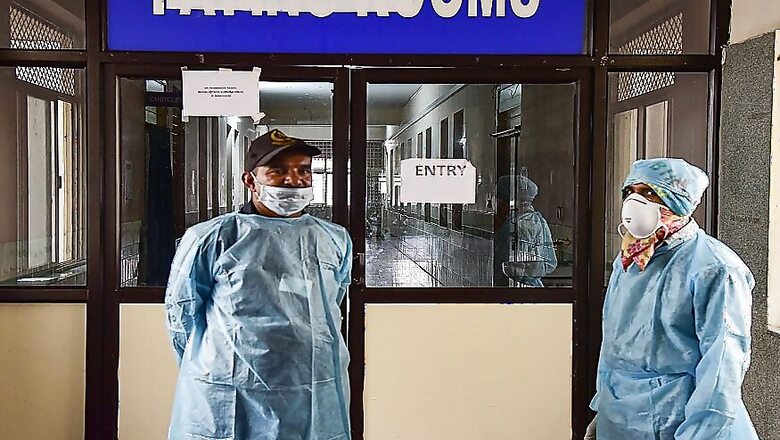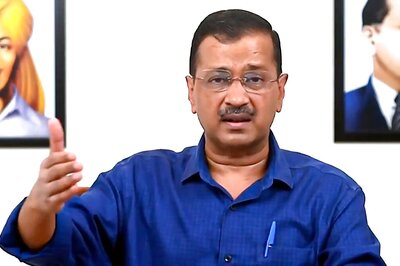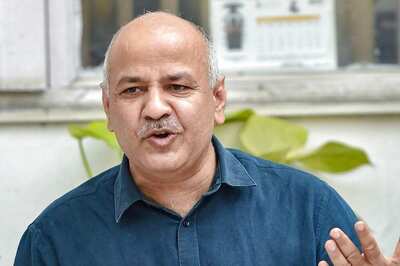
views
Healthcare workers have rightfully been dubbed as the 'frontline soldiers' in the battle against coronavirus. However, irrespective of the country they belong to, most medical professionals have found themselves on the losing side of the battle against Covid-19 in the past few months.
Many such workers have, unfortunately, paid the price for the shortcomings of an overstretched healthcare system of their respective countries with their own health (both mental and physical) as well as their lives.
According to a list published by National Federation of Orders of Surgeons and Dentists, 50 doctors have died of coronavirus in Italy so far and approximately 5,000 medical professionals have been infected. Most of the initial cases of healthcare professionals contracting the virus happened due to the lack of protective gears.
Last week, Spain's health ministry reported that nearly 14 per cent of their confirmed cases (approximately 5,400 people) are healthcare workers. In the United States, which is by far the worst-hit country, sources claim that almost 60 positive cases of coronavirus in healthcare workers have been found.
Close to home also, medical professionals have been badly affected. An octogenarian doctor died of Covid-19 in Mumbai last week, marking the first doctor death due to the disease in India. Apart from him, nine other doctors have contracted the virus. A nurse from Gurugram and a ward boy from Bihar have also been infected and the numbers will continue to rise if India doesn't prioritise the health of medical professionals, thereby ensuring better public health.
Fear Factor
Despite the lockdown, India has seen a consistent surge in Covid-19 cases. So far, 1,024 people have tested positive, out of which 27 people have lost their lives. However, the biggest concern of medical professionals at this point is neither the fragile state of Indian healthcare system nor the growing number of patients that can potentially surpass hospital capacities, as it has in Italy and the United States.
All they fear now is the possibility of contracting the virus. "Since the news of doctors testing positive began doing rounds, there has been a sense of fear among doctors and nurses treating coronavirus patients," said Dr Parthiv Sanghvi, former secretary of IMA Maharashtra who is currently an honorary surgeon at a BMC-run hospital in Jogeshwari East. The hospital has been identified as a Covid-19 isolation ward. "It is only natural to fear the virus, it has affected several doctors so far. One of my colleagues tested positive recently. He is currently on a ventilator in the isolation ward," he added.
Although the deceased Mumbai doctor is said to have contracted the virus from his relatives, in India, there have been several cases in which healthcare workers have contracted the virus while treating patients.
In Uttar Pradesh, a 25-year-old resident doctor tested positive for Covid-19 after coming in contact with a coronavirus patient. A similar thing happened to the ward boy in Bihar, and another doctor in Mumbai. A Karnataka doctor also tested positive for the same reason.
“It isn't just doctors, there is also panic among paramedical workers, nurses, ward assistants and cleaners. Nowadays, healthcare workers are viewing every patient as a potential coronavirus patient, who can infect them. It is a very sad reality,” said Hemant Deshmukh, Dean of Mumbai’s KEM Hospital. Almost a hundred patients are rushing to KEM Hospital every day, with symptoms of cold, cough or fever, because it is a testing centre for coronavirus.
“Everyone thinks that they have coronavirus these days," said Deshmukh. "Under such circumstances, the only thing that we can do is to teach healthcare workers to take utmost care of themselves," he added.
Protecting loved ones
Apart from the fear of infecting oneself, health workers are also worried about transmitting the disease to family members, especially ageing parents, and young kids. "A nagging thought that worries me is that my father is a diabetic and he may get exposed to the virus because I go home from a hospital that is treating coronavirus patients currently. People like him are at greater risk," said Mariya Baby, a nurse at a Delhi hospital.
Baby works at a cancer ward and even though she doesn't deal with Covid-19 patients directly, it still makes her very anxious. Another nurse, Alby Matthew, who also works in a Delhi hospital said that she hasn't seen her family in weeks because of the pandemic.
"Ever since the coronavirus pandemic broke out, I have only seen my family on video calls and Whatsapp photos," she said.
Mathew, who lives in a hostel, has been advised by her hospital authorities to not visit home over the weekends until 'the situation eases out'. But, she isn't complaining
"The only silver lining in this situation is that I am at least reducing my father's chances of being exposed to the virus," said Matthew.
Low pay, long shifts, and discrimination in society
"The doctors who have been specially recruited for treating coronavirus patients by the corporation are being paid Rs 80,000 per month for an eight-hour duty. I don't know if you call that a lot, especially when such a life risk is involved for them in doing their jobs," said Sanghvi.
Since the outbreak, our shifts have been changed from 6 hours to 12 hours, which has been taking a toll on our health, pointed out nurse Alby Matthew. "It is an exhausting task to pull off such a long shift. However, the relief is that after the 12-hour shift we get the next day off. This reduces our chances of exposure, and also gives us time to rest," she added.
Media reports from the United States, Italy, Spain and France, however, claim that doctors and nurses in those countries have no resting privileges currently. They work graveyard shifts, fight exhaustion and mental health issues to provide care to the affected patients. In an incident that brought the mental health fallout of the crisis into sharp focus, an Italian nurse working at a hospital in Lombardy took her life last week after she tested positive for the novel coronavirus.
Reports also claim that when these doctors are in the hazmat suits, they cannot eat or take a washroom break for almost 6 hours at a stretch. Many have stopped returning home too, as they do not want to put their loved ones in harm's way. However, the most challenging thing for them so far has been to decide whom to offer hospitalisation and whom to send back home as the number of beds is limited.
While things are not as bad in India, medical professionals here are facing another peculiar phenomenon. Several of them have been ostracised from society and many have been forced to vacate their flats because landlords are prejudiced and they fear that a doctor increases the changes of coronavirus because his job entails that he deals with the virus every day.
Slow response, playing catch-up
India's response to the pandemic was reactive rather than proactive. When initial cases were reported, neither doctors nor hospital authorities were prepared to handle the situation, despite the fact that by then coronavirus had cost several lives and infected many in other countries, posing a global threat.
Dr Raman Sharma, Senior Professor at Department of Medicine, SMS Medical College and Hospital, Rajasthan said, "On the evening of March 3, when an Italian patient tested positive in Rajasthan, we formed a high-level board to decide on the kind of treatment we should offer to the patient."
"It was a really challenging task because we had never treated such a patient before, and had no idea what treatment to offer. The patient had co-morbidities and was quite sick so we quickly devised a treatment strategy based on the work done by researchers in the past and led with that," he added.
When cases of coronavirus began surging in India, the biggest complaint from several medical professionals on social media platform, as well as to hospital and health department authorities, was that they do not have proper personal protection equipment (PPEs).
Doctors working in isolation wards in Patna wrote to the secretary of Health Department stating that they do not have basic equipment like N95 masks and were serving without protective gears. According to a report published in The Outlook last week, doctors in Punjab had also written a letter stating that things as basic as sanitizers, gloves and masks were not being provided to them. An AIIMs doctor's letter pointing out lack of PPE had also gone viral more than a week ago.
However, India has since then scaled up healthcare logistics. Doctor Sanghvi said, "The doctors and nurses who are working in the isolation ward in my hospital has not complained about lack of personal protection equipment in hospitals. Anyone who is dealing with coronavirus patients, be it the ward boys or cleaners are being given proper protection."
Director of Medical Education and Research, Maharashtra, Dr TP Lohane said, "There are different kinds of PPE depending on what kind of patient is being examined. If a patient who has no signs of fever is being examined then the health worker will only have to wear a triple-layered mask. Those who are treating patients with fever should use N95 masks and HIV disposable suit. Only those offering treatment to coronavirus positive patients need hazmat suits."
Lohane claimed that so far the need for hazmat suits have been met in Maharashtra, and more are currently being manufactured.
"In Kasturba Hospital for Infectious diseases, many coronavirus positive patients are currently being treated and despite the fact that healthcare workers of three different shifts come in contact with them each day, the total number of hazmat suits required so far has been only around forty-five."
Maharashtra, as of now, has had six confirmed deaths, and 193 positive cases of Covid-19, which is the highest number any state has in India. However, the availability of equipment hasn't been an issue yet. Of all coronavirus cases, only a small per cent are severe enough to require hospitalsation, and an even smaller number require ventilator treatments, said Lohane pointing out that there are enough ventilators as on now, to treat the patients.
"It has been more than eight days that we have set up new factories where workers are making 5,000 hazmat suits every day. We have almost 21,000 such suits ready now and are distributing them according to the needs of the people. So, we are trying our level best to give everyone PPE," said Lohane.
Lohane also said that all medical professionals of Maharashtra will complete receiving training on dealing with Covid-19 by March 31.
Scaling Healthcare infrastructure
Needless to say that central, as well as various state governments, are making efforts to tackle this public health emergency, but what will determine India's success rate in fighting coronavirus will be the speed with which India comes up with logistical solutions to offer affordable healthcare, and manage its medical staffs and equipment. Another important factor, of course, is how the virus spread in future.
While many ad hoc, not peer-reviewed researches have suggested several gloomy outcomes for India, how things play out will only be known after the lockdown, when the government take stock of the situation.
In India, the doctors to population ratio are 1:1,800 which is much lower than the minimum recommended by WHO which is 1:1,000. Furthermore, in rural areas, there may be just one doctor for a much larger population and hospitals without any infrastructure to accommodate coronavirus patients. How feasible is it, in such cases, to transfer those affected in rural areas to city isolation centres if the spread of the virus continues in future? The total number of ventilators in India is also approximately at 40,000, which may not be enough if new cases continue to arise. It would also require a qualified healthcare professional to operate ventilators, who also may not be available.
As far as healthcare workers in India are concerned, there is a huge untapped workforce in doctors who have a private practice. They can be a great asset if we face tough times ahead. Sunita Manglik, a family physician from Mumbai, is one of the many doctors who are currently offering voluntary advice on coronavirus on helplines. "Our OPDs are currently shut, so we are trying to help in whichever we can in the battle against coronavirus," said Manglik, adding that this is the time for doctors to come together to help.
Protecting healthcare workers
India followed in China's footsteps in announcing a complete lockdown for a 21-day period but so far, it has not taken any lessons from the country in protecting its healthcare professionals.
After 1,300 healthcare workers contracted the virus in Wuhan, and took it home, infecting a much larger population, China took some drastic measures to ensure the safety of its healthcare workers. For starters, they were asked to live in isolation, away from their families, and made to wear hazmat suits at all time.
A medical professional told CNBC that in places like Singapore, Hong Kong and South Korea too, medical professionals were far less impacted than in countries like Italy, and United States, because they were made to undergo mandatory symptom checks every time they reported for duty, and anyone who has symptoms was immediately sent home. Such methods should be implemented in India too, to ensure that those who are risking their lives to save others, can also stay protected.




















Comments
0 comment